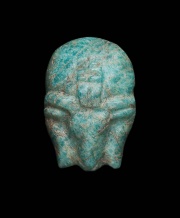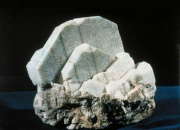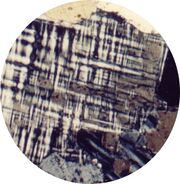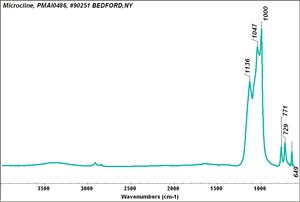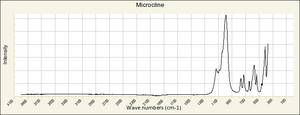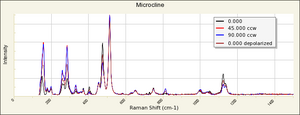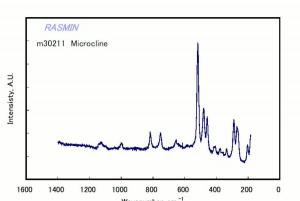Difference between revisions of "Microcline"
Jump to navigation
Jump to search
| (One intermediate revision by the same user not shown) | |||
| Line 6: | Line 6: | ||
[[orthoclase|orthoclase]]. However microcline has a triclinic crystalline system while orthoclase has a monoclinic crystalline system. Microcline may be clear, white, pale-yellow, brick-red, or green. Under a polarizing microscope, microcline displays a minute multiple twinning that forms a grating-like pattern. Amazon stone, or | [[orthoclase|orthoclase]]. However microcline has a triclinic crystalline system while orthoclase has a monoclinic crystalline system. Microcline may be clear, white, pale-yellow, brick-red, or green. Under a polarizing microscope, microcline displays a minute multiple twinning that forms a grating-like pattern. Amazon stone, or | ||
[[amazonite|amazonite]], is a green microcline that has been used since antiquity for decorative items. Microcline is used in making glass, porcelain, and enamel. Major deposits are found in Italy (Baveno), Norway (Kragerø), Madagascar, Russia (the Urals), and the U.S. (Colorado). | [[amazonite|amazonite]], is a green microcline that has been used since antiquity for decorative items. Microcline is used in making glass, porcelain, and enamel. Major deposits are found in Italy (Baveno), Norway (Kragerø), Madagascar, Russia (the Urals), and the U.S. (Colorado). | ||
| − | + | ||
== Synonyms and Related Terms == | == Synonyms and Related Terms == | ||
[[File:Microcline.jpg|thumb|albite twinning under polarized light; credit Eurico Zimbres]] | [[File:Microcline.jpg|thumb|albite twinning under polarized light; credit Eurico Zimbres]] | ||
| Line 19: | Line 19: | ||
* Luster = vitreous | * Luster = vitreous | ||
* Streak = white | * Streak = white | ||
| − | * Fluorescence = generally inert; may show weak yellowish green in | + | * Fluorescence = generally inert; may show weak yellowish green in LW |
* Pleochroism = absent | * Pleochroism = absent | ||
Latest revision as of 12:21, 19 December 2022
Description
A variety of potash Feldspar that is chemically identical to Orthoclase. However microcline has a triclinic crystalline system while orthoclase has a monoclinic crystalline system. Microcline may be clear, white, pale-yellow, brick-red, or green. Under a polarizing microscope, microcline displays a minute multiple twinning that forms a grating-like pattern. Amazon stone, or Amazonite, is a green microcline that has been used since antiquity for decorative items. Microcline is used in making glass, porcelain, and enamel. Major deposits are found in Italy (Baveno), Norway (Kragerø), Madagascar, Russia (the Urals), and the U.S. (Colorado).
Synonyms and Related Terms
amazonite; feldspar; microclina (Esp., Port.); microklien (Ned.)
Physical and Chemical Properties
- Color= colorless, white, pale-yellow, brick-red, or green
- Crystal system = triclinic, exhibits albite twinning (grating pattern)
- Cleavage = perfect in one direction and good in another
- Fracture = uneven
- Luster = vitreous
- Streak = white
- Fluorescence = generally inert; may show weak yellowish green in LW
- Pleochroism = absent
| Composition | K2O-Al2O3-6SiO2 |
|---|---|
| Mohs Hardness | 6.0-6.5 |
| Density | 2.5-2.6 g/ml |
| Refractive index | 1.514- 1.539 |
| Birefringence | undetectable to 0.007 |
Resources and Citations
- Gem Identification Lab Manual, Gemological Institute of America, 2016.
- G.S.Brady, Materials Handbook, McGraw-Hill Book Co., New York, 1971 Comment: p. 316
- Jack Odgen, Jewellery of the Ancient World, Rizzoli International Publications Inc., New York City, 1982
- Encyclopedia Britannica, http://www.britannica.com Comment: "microcline" [Accessed March 4, 2002]
- Ancient Egyptian Materials and Technologies, Paul Nicholson, Ian Shaw (eds.), Cambridge University Press, Cambridge, 2000 Comment: B.Aston, J.Harrell, I.Shaw, "Stone" p. 21-22.
- Wikipedia: Microcline (Accessed Sept. 10, 2005 and Dec 2022)
- Van Nostrand's Scientific Encyclopedia, Douglas M. Considine (ed.), Van Nostrand Reinhold, New York, 1976
